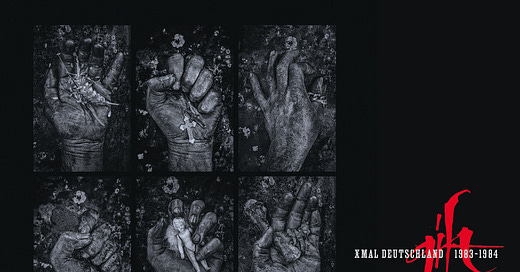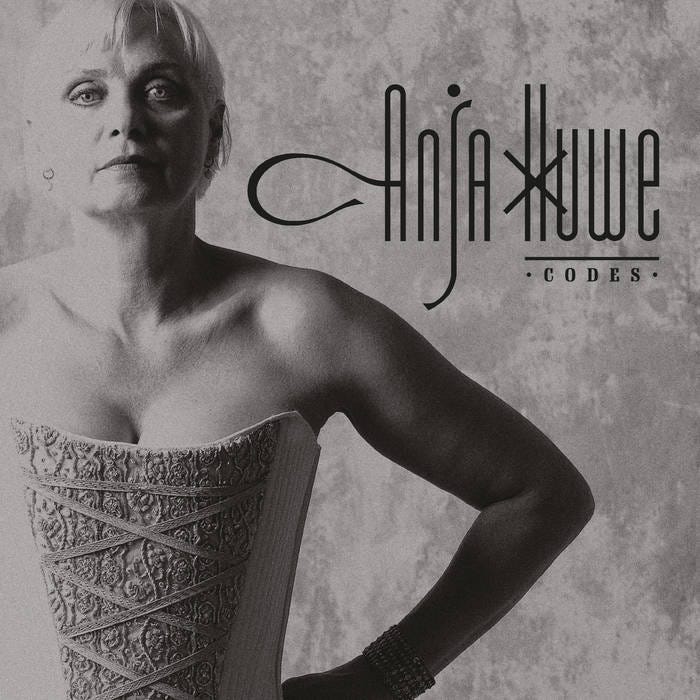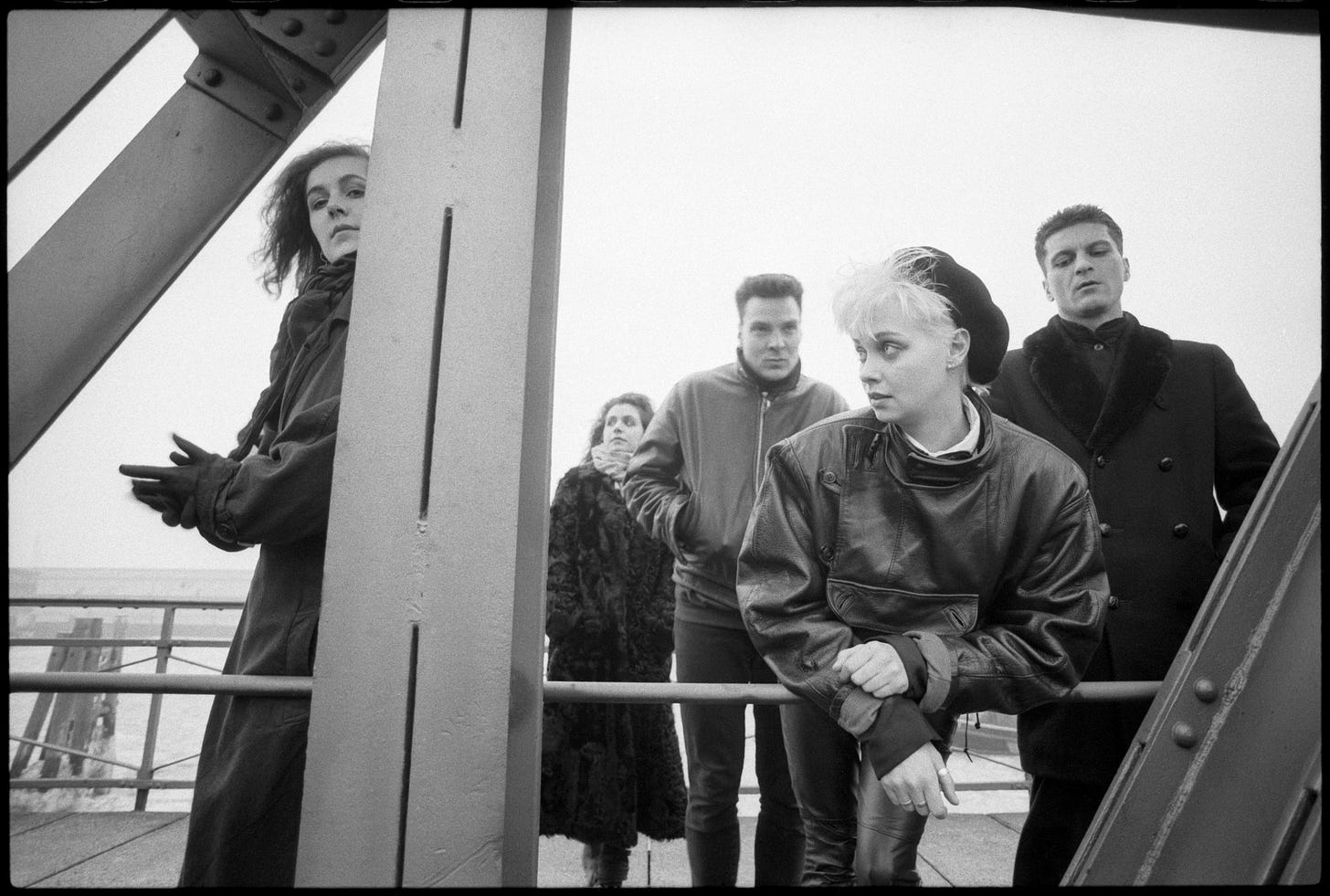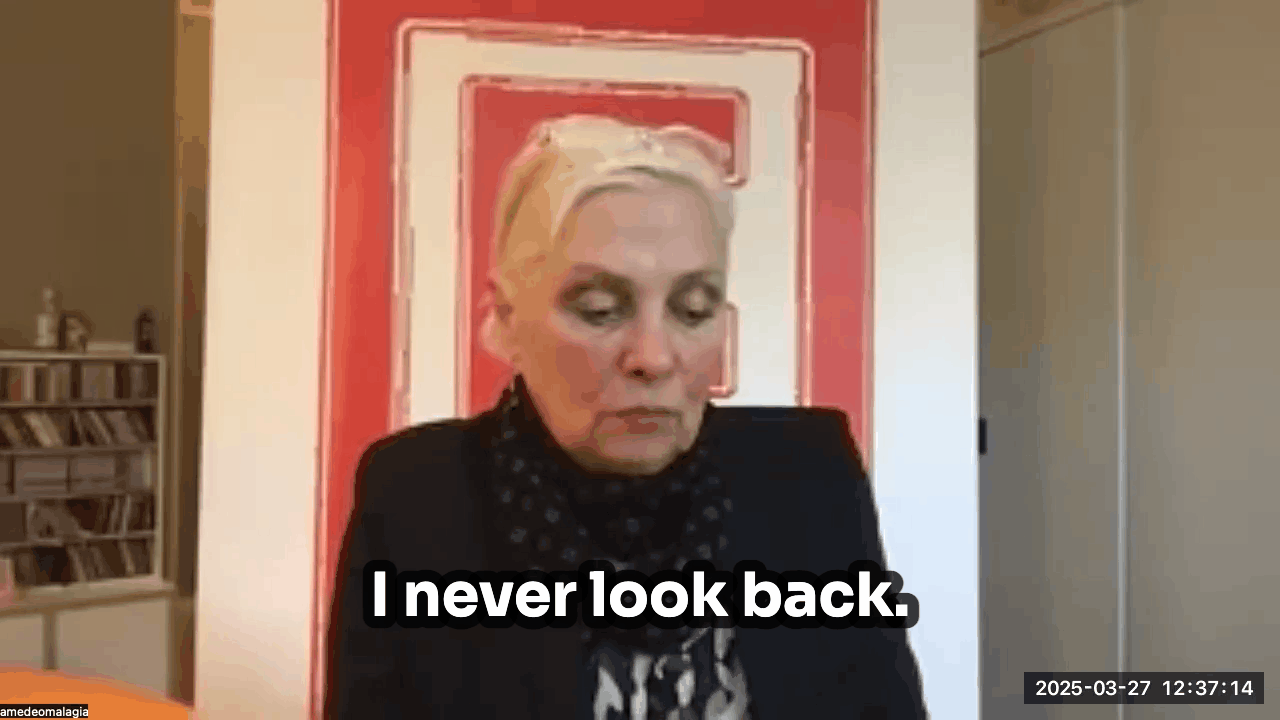Anja Huwe of Xmal Deutschland Never Looks Back
I interview the post-punk icon about her synesthesia, her debut solo album Codes, and the band’s newly remastered 4AD albums. Then I made her an art installation in playlist form.
I have a confession to make.
Until about three years ago, I hadn’t even heard of Xmal Deutschland, the iconic ‘80s goth/post-punk trailblazers that shaped the trajectory of darkwave for years to come.
I’m pretty sure I discovered them on a TikTok channel that curates obscure ‘80s music.
I then spent the next few months in a Tocsin loop, realizing how I was bridging the gap between Xmal and the Cocteau Twins, Siouxsie and the Banshees, and countless post-punk bands that came after.
I didn’t share this embarrassing tidbit with Anja Huwe when I sat down to talk to her last month, though I doubt she would have thought twice about it if I had.
In fact, maybe you haven’t heard of Xmal Deutschland, either.
There’s a reason they were on that TikTok channel of obscure ‘80s music after, all.
But don’t worry. If you’re in the same boat as I was recently, you’re in for a treat.
Anja is putting out a new box set next month of Xmal Deutschland’s early 4AD albums, so you’ll soon have a chance to hear the band’s early work remastered — better than brand new.
We discuss it below, as well as her synesthetic painting practice, her 2024 solo album Codes, and what it’s like to be discovered all over again by a new generation of fans.
Oh — and yes, I made her a playlist.
What can I say? After she told me she wasn’t interested in new music right now, I couldn’t resist.
An Interview with Anja Huwe
Hearing Colors, Seeing Sounds
Gabbie: You put out your first solo record Codes last year, which was a huge surprise after your long hiatus from Xmal Deutschland. As somebody with synesthesia, and whose visual art has always been described in musical terminology, did you actually feel like you'd been away from music during those decades? Or did your music simply take on a different form of expression for a time?
Anja Huwe: I was never really away from music because music was always part of my life through various media. But coming back to synesthesia — when I was in Xmal Deutschland, and we were in rehearsals, I always said, “can we play this song, this… red song?” And they’d say, "what are you talking about?!"
That's how it all started. [Later], I had two very interesting experiences. One was with the guitarist from Simple Minds, Charlie [Burchill]. I was in connection with their management and they said, "yeah, Charlie has the same thing". So I thought, "Oh! There are just two of us out there." [Laughing]
And then, when I went back to art after a long period of music — when I decided I just want to go back and work with color with no discussions with other humans or anything, I started working on this dot sort of thing.
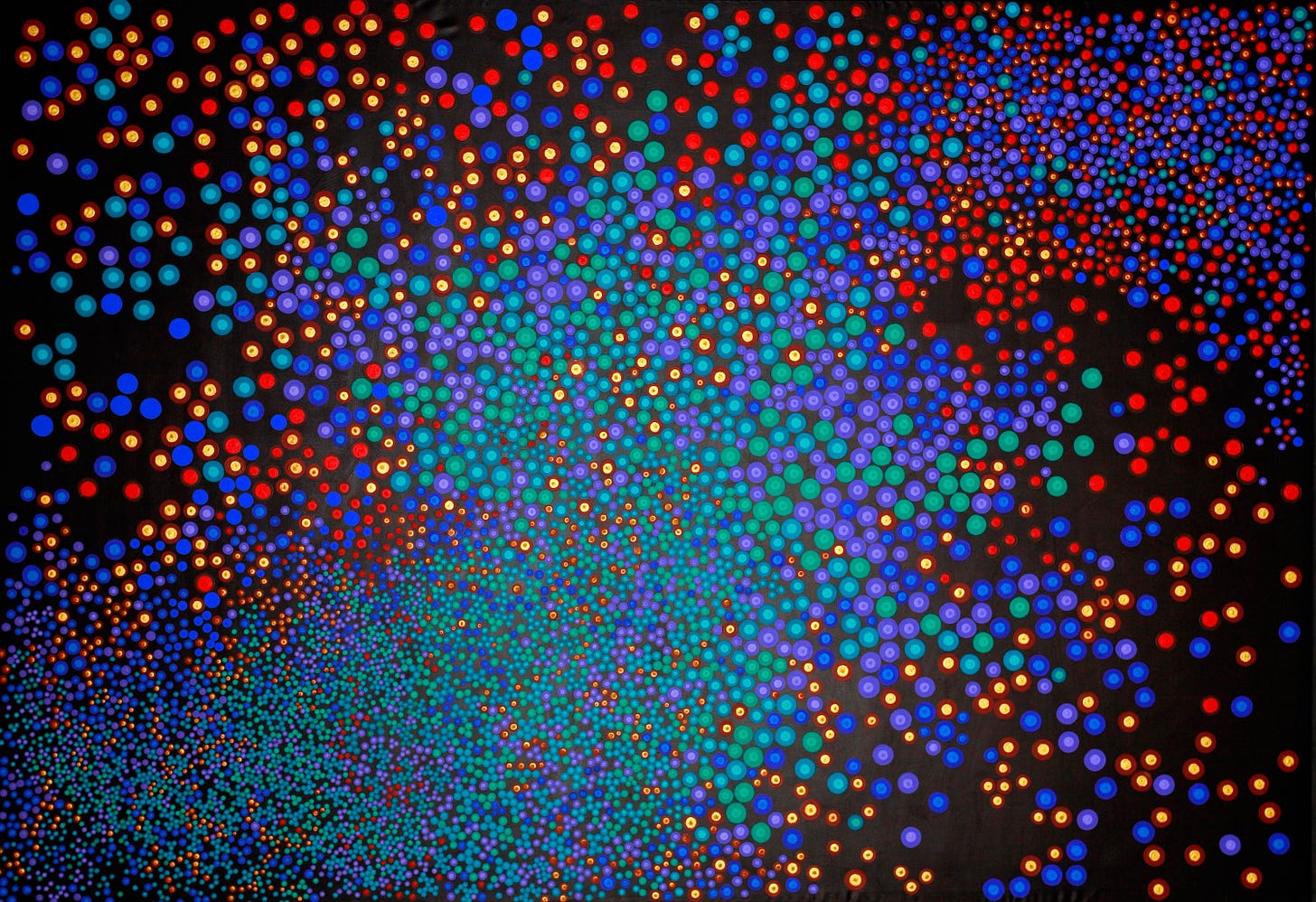
I did that in my very early days too. But I went back to it in big sizes, and even there I was going on about it, [saying], “these are melodies and structures, rhythms.”
A friend of mine said, “Did you ever think about this synesthesia? Do you know what it is?” No.
Then in New York, my curator told me, “yeah you're not the only one.”
G: [Laughing] Oh, you're not special!
AH: [Laughing] And it was so funny, and so I developed it constantly into more and bigger and circles and philosophy of circles. So yes, I still connect music and color, of course.
The Threads Behind “Codes”
G: When I think of you going back to making music, I have this image of you as this reluctant prophet, as somebody who kept saying “no” for years after friends encouraged you to get back to it. Does that resonate with you at all, or was there something in particular that motivated you to return — a moving story? The relative quiet of the pandemic?
AH: Yeah, I see your point. The pandemic brought many people back into various arts, absolutely. Creators need a certain amount of attention, obviously.
But then again, I never expected myself to go back into music. It was definitely the story that Yishai [Sweartz] came to me with. [He] got in touch and was talking about a friend of [his], a doom metal guy from Norway that no one ever met, [who] wrote this basic track Skuggornas — meaning “shadow”.
He sent me the song and I said, “no, I don't sing anymore.” But he just sent it [anyway]. He said, “it is about darkness; just add your own words if you have time. Just give it a try.” And yes — I gave it a try. I sung it into my iPhone.
Words, like codes, are what we have in life — if you lose your codes, you lose yourself.
I sent it over to Berlin. My friend Mona [Mur], she has a studio, and she always tried to convince me to go back to music. I said no, but she said, “this is cool — why don't you come over and just give it a try, and if you don't like it, just forget it.”
We started talking to Yishai about his family history. And that was really bizarre because then [he told us about his grandfather’s diaries].
Codes was “initially inspired by the diary entries of Moshe Shnitzki, who, at the age of 17, left his home in 1942 to live in the cavernous White Russian forests as a partisan.”
Then [after writing his diaries] he died, and so we asked if we might be able to read them. Because it's just interesting intellectually what happened there. He wrote about how words, like codes, are what we have in life — if you lose your codes, you lose yourself.
[We decided to] bring it to life through music. And it was so intense, reading books about all this. What does that do to you, when you live in the woods on your own? How do you survive?
I brought my lyrics in and at some point I said to Mona, “you know what — why don't we write an album here?” And then we brought [Xmal Deutschland guitarist] Manuela [Rickers] in — because I need her, I need the certain sound that she plays.
Then we [just had to] try to find someone to finance it. I met Caleb [Braaten] from Sacred Bones [in New York] and he was very much into it and also into Xmal Deutschland, and so we collaborated.
G: It really sounds like everything just fell into place at exactly the right time to pull you back in.
AH: Yeah, that's very true. And it was natural, it was not like — get some money and do something. It was just a very constant development and no pressure. Because no one knew about it!
What’s in the Box?
G: We’re really here to talk about Gift (The 4AD Years): the new box set that includes remasters of Fetisch and Tocsin. “Gift” means “poison” in German, doesn't it? This release is undoubtedly a present for existing fans, but what do you want new listeners to get from it? Are they in for poison?
AH: [Laughing] Never! That's the vampire aspect, yeah? No, we always did this, using words that have two meanings, like Fetisch/fetish. We like that. So we came up with this because I thought “Gift” is so simple, it's like a gift, but it’s a tool.
Even for many people in the early days, the music that we made was a kind of poison because it wasn't pop; it was dark. And a certain community liked it, but others never got it for certain reasons.
When we were making music, everyone was tuning into the Neue Deutsche Welle, which was pop-ish kind of music. That's when we disappeared here [in Germany] and said, “we’ll go to London.”
G: And Germany didn't appreciate you as much as those abroad.
AH: They would've picked us because we were girls and good looking. They would've instantly put us into [all that] synth-pop.
Even for many people in the early days, the music that we made was a kind of poison because it wasn't pop; it was dark.
Anyhow, [I’ve been asking] already for a long, long time to re-release this stuff because none of our records were out for ages, and we thought it would be a good time to get [it] together. The time is right, you can really tell — I'm doing lots of interviews and everyone is very open and up for it, which is unusual for us. I love it!
Xmal’s Legacy
G: Xmal Deutschland disappeared without a bang, and now you’re returning to so much excitement for this re-release. What is it like for you to come back to having this whole mythology formed around you — to be these legends of post-punk?
AH: I didn't expect it, because I worked on this release quite a lot, and to have it out and to have this response to it, it’s amazing. I'm really surprised.
But the response… you wouldn't believe it. It's just crazy. People were so positive and so friendly and some of them were crying. And I started crying too!
Also because I started playing live again — and I never got on stage again — but I [finally] did in Den Haag and Paris. That was an amazing experience because even there, we played some of the very old tracks and we did them a bit more electronic.
But the response… you wouldn't believe it. It's just crazy. People were so positive and so friendly and some of them were crying. And I started crying too! What is going on here?? The response was amazing: “How about the old stuff? Will you re-release it?”
G: How do you think that younger audiences are experiencing your music differently from your first set of fans?
AH: I think there is a young audience out there that [just] discovered it, and it's very interesting because they find it really exciting. Not only because of the music, but younger people these days — they want stories.
They want the story behind [everything]: how did you do this and what happened? And do you think we can make it too? Which is difficult, because what we did was analog, and these days are different. It's all digital what we do now, it is a different life.
Younger people these days — they want stories. They want the story behind everything.
There are so many bands out there, young bands, and definitely many good artists that should be supported. But it's so many; it's very difficult to go through all this, and to make it at some point. That's why many [older artists] who came back [like Xmal] are successful because [those who know them] rave and [others] — they never discovered it before, so it's something new to them.
G: I know that the music industry is maybe not so kind to newer artists. What kind of advice would you give to someone just starting out?
AH: I find it difficult to give advice really because, what can I say? The way we did it is the way we did it, but it's very difficult. You need a lot of luck and maybe someone who supports you, takes you maybe on tour or something. It is very difficult, I have to say, and whoever makes it at some point or sells out — Congratulations.
G: What is your experience listening back to your own old music? Do you feel like it's a version of yourself? Or something completely separate from who you are right now?
AH: It's hard to say because I never listened to my own work, really.
I started working with Manuela on [some of our old tracks] and I said, “Manuela — this is the first time that I realized how simple they are and how straight[forward] and how classic they are.”
We're like aliens in a way — living in our own bubble.
So we had to change them in a way, in an electronic sort of way. It was the first time where I thought that some of these songs are great songs. They are so forward and so on. I did not realize that before.
G: There's a reason people love you so much, even to this day.
AH: In the early days. It was not like that. We had fans of course, but in general it was — “What is the name? Oh, they’re girls. Ah, okay. Did you play?” I mean we played all over and it’s different now because there’s this legacy, this thing, this German band.
Looking back I think what we did those days, it just came out of our bellies, it was not made up or anything. It was just there. And we had only 10 songs, so that’s what went on the album.
We did not constantly work because there was other stuff to do, so we maybe sometimes didn't really take it seriously because we did not get what was really there and the potential. Maybe also because we lived in Germany and went to London — played here and there and everywhere. We're like aliens in a way — living in our own bubble.
Never Look Back
G: Do you listen to new music? Are any new bands catching your attention?
AH: I have times where I listen to a lot of music, but right now, not at all.
I'm so in my world with my songs, my work, and that's far too much to just go back to new music. I will at some point, yeah. But there are so many bands out there that very much sound alike, and I know where that comes from.
I find it a bit boring and I much more prefer electronic music: no vocals, just sounds. But maybe at some point I will discover something new and I hope something new comes up. It always [comes] in waves.
G: A lot of my readers connect with new music that they can trace backward through older bands that they're nostalgic for. Do you see your work as part of a lineage like that, or do you try not to look backwards too much when you are creating something new?
AH: I never look back. I always go forward.
There's so much more that I want to do, and I have so many ideas. I'm good with what I did. What is my past? I don't stand still. Even when I go back home now, I will start working on some collages and pictures that I discovered.
I'm ongoing, so I never really think, “this is what I did, and now I have to take a rest and look at it.” No, it's like it's part of my life and there's more to come.
G: Maybe that's the good advice to give to younger artists!
Gift is out May 9th
Gift (The 4AD Years) will be available on May 9th, 2025 on (you guessed it!) 4AD. You can pre-order the box set here.
A Playlist for Anja (but mostly for you)
I missed the opportunity to make Anja a subject of my New Music DNA series.
I didn’t get a chance to ask her in more detail about the music she likes (though she did tell me how much she loved The Cure’s latest album).
Mostly, I learned that
She prefers electronic music, and
New music generally is boring her these days.
Well, that’s a challenge I can’t ignore, right?
Think of this playlist as a kind of audio art installation.
Some of it might sound a bit like Xmal Deutschland. Some of it is electronic. But I mostly used it as an opportunity to explore and share the kind of music I normally don’t get a chance to in this newsletter: artists who play with sound structure in unusual, sometimes unsettling ways.
And all new, of course.
I have no reference points, the way I usually do, but I’ll still pull a few example tracks:
O. - TV Dinners
Chaotic jazz/post-punk blend.
aya - I am the pipe I hit myself with
If a brillo pad were music.
Yves De Mey - Auger
Electronic/instrumental. Tactile. Foreboding.
The rest, below.
Keep reading with a 7-day free trial
Subscribe to New Bands for Old Heads to keep reading this post and get 7 days of free access to the full post archives.


